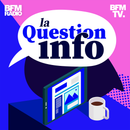Is it really necessary to give mineral water to babies?

It's a water whose digestive properties are praised, and which many young parents have in their cupboards: Mont Roucous . But for the past few days, these bottles have been rare on the shelves, as the brand apologized on its website.
"We are forced to space out deliveries to your stores," the company explains, noting ever-increasing consumer demand. But is it essential to give young children bottled water? BFMTV asked pediatrician Emmanuel Delmas (AP-HP) this question.
The answer is clear, according to the social media popularizer : " Mineral water is not at all necessary for children's development or their nutritional needs," the specialist states. "So, in itself, this news of a shortage is not very serious."
The French health authorities' recommendations on the water to give to young children are clear. The ministry recommends tap water or bottled water as a first resort, provided you check the label to ensure it is suitable for infants, which is not the case for all products on the shelves.
However, some parents sometimes opt for these mineral waters, not for daily consumption, but to "relieve" their children's ailments.
"Parents often think their baby is constipated, but that's not the case. The first thing to do when in doubt is to consult a healthcare professional. But the second question is, is there any benefit in taking these specific mineral waters in cases of constipation? The answer is no," replies Emmanuel Delmas, adding that there is "no scientific evidence to show that mineral waters can promote transit."
The idea that these waters have specific virtues is spread mainly by word of mouth, from parent to parent, but also via social networks, in the marketing arguments of retailers, and sometimes on the recommendations of certain pediatricians who wrongly share "these preconceived ideas".
Tap water is therefore a parent's best friend, with a few precautions. While the drinking water network is closely monitored and of high quality in France, exceptions do exist, and parents are advised to check with their local authorities.
Other tips for maximum safety are to always use cold water, let it run for a few seconds, and not let the tap come into contact with the bottle to avoid bacterial contamination .
Another notable point is not to use a filter - either directly on the tap or in filter jugs - which can "be contaminated very easily by bacteria and germs."
This is indeed what the National Agency for Food, Environmental and Occupational Health Safety (ANSES) concluded in its latest report , which called for the exclusion of the use of these devices for feeding infants.

One unknown remains. While the presence of microplastics in plastic and glass water bottles has been documented, the contamination of tap water with "eternal pollutants" is becoming a cause for concern. "It's a complicated issue, it's an emerging topic. There's no consolidated data on this yet, and it's difficult to provide information or reassure parents," the pediatrician laments.
BFM TV




